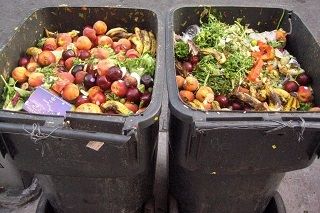From Guest Blogger Erich Lawson: Simple Tips On How To Reduce Food Waste


Image Source : unclebobs.com
Here are 14 ways to recycle and reduce food waste by optimizing your spending, storage and waste disposal patterns:
- Keep Your Fridge and Freezer at the Right Temperature – Cold temperatures might not be able to kill microorganisms, but they do halt their progression. Check the temperature regularly of your fridge regularly and adjust the thermostat if it’s getting too warm.
- Reorganize the Kitchen – If you often end up with stale produce because you simply didn’t remember it was there, reorganize your kitchen so you can keep perishables where they’re easily noticeable.
- Increase the Shelf Life of Groceries – One of the easiest ways to make produce last longer is to store it properly. There are hundreds of ingenious ways, like storing onions in pantyhose, mushrooms in a paper bag, placing tomatoes upside down and freezing bread to prevent mold.
- Reuse or Repurpose Leftovers – Just because you don’t want to eat the same dish again doesn’t mean you have to throw it away. Get creative and find some other use for it. Some fruits can be frozen and used as flavorful ice cubes, flat soda will make your blackened dishes sparkle, and much more.
- Make a Note of What You’re Throwing – Before you toss any food items in the trashcan, write down what is being wasted. Keep track of the things that get wasted most often, so you’ll know what to buy less of.
- Plan Weekly Meals before Shopping – Set aside a little time each week before you go to the market and list out what meals you plan on making during the next week. Build your shopping list accordingly, so you don’t end up buying unnecessary items.
- Reconsider ‘Expiration’ Dates – Most expiration dates are decided by the manufacturers, and often only indicates when the food will cross its peak freshness. Products beyond the sell-by date are not always expired – that is just the longest a store can display the product.
- Buy Fresher Products and Use Up Older Ones – Stores have to sell products by the sell-by date and it’s in their best interest to push older stock, so check the back of the display shelves for fresher batches. At home, keep products closer to expiring in front and use them first.
- Shop with a Plan and Stick to It – One of the major reasons food gets wasted is over-enthusiastic shopping. Make a list of what you have and compare it with your shopping list. Shopping alone reduces the chances of impulse purchases that aren’t needed.
- Don’t be Penny Wise and Pound Foolish – Buying in bulk can save money, but only if you don’t end up throwing away excess products. Try and get friends or family members to participate so you can get the most out of your bulk shopping.
- Buy Local, It’s Fresher and Cheaper too – Shipping takes time and that time cuts into how long you can store any food item. Try and buy groceries, meats and perishables that are locally sourced. The reduced cost of transport can result in lower prices too.
- If All Else Fails, Buy Cheaper Food – If you’ve tried everything and still end up throwing a lot of food away, stick to groceries that cost less, since most of them will go to waste in any case.
- Set up a Compost or Worm Bin – Compost unused parts of groceries, like orange peels, dried-out bread and apple cores. They degrade faster than they would in a landfill and you can use it to grow your own food too.
- A Penny Earned is a Penny Saved – There’s a huge demand for recyclable products. Check to see if you can sell recyclable garbage like packaging plastic, newspapers or even old garments. Make it a community venture with equipment that is purpose-built to handle waste, like trash compactors and balers.
There are many other ways you can reduce food wastage, but the most important decision is to start now. If you’re still not convinced, make a list of what you throw in just one week and list out what it cost. Once you’re done wincing, read through this post again and this time, take notes!

Great suggestions and ideas! Reducing the food waste will increase not only our savings, but our waste management as well! I totally agree that reusing all the leftovers is great way to learn and cook something new. Thanks for sharing here!